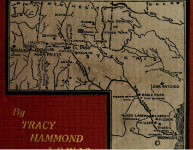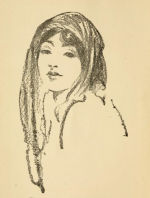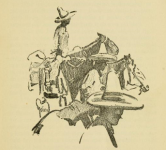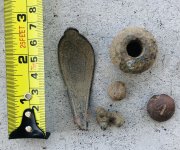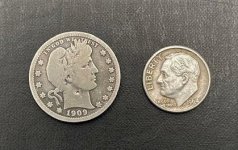Old Bookaroo
Silver Member
- Dec 4, 2008
- 4,318
- 3,510
CHAPTER IX. The Lost Mine of Tayopa.
One day late in July was bad, but in that it proved no exception to a great many other days through which El Paso had sweltered. I had spent the morning visiting Battery A of the First Massachusetts Artillery, which had not been of the slightest aid in becoming cooler, as the officially announced temperature of 95 degrees did not apply to Camp Pershing. There was no shade in which to find such frigidity.
Two o'clock found me at the corner of Santa Fe and San Francisco streets. I turned up the latter partly because I had never done so before and partly because there was shade in which I could walk. I passed a rickety little old place with "Cantina" printed above the door. In the gloomy interior I could see a few tables and chairs, with some persons idling over their glasses.
I stopped and stepped in, for I had discovered a spot into which sunshine never intruded - and sunshine had been pursuing me all the morning. 1 reflected that the shack must contain within something of a nature that atoned for its shabbiness without. The floor of the room was of unpainted wood, though it had long lost its original lightness of color. The plaster walls boasted the only paint on the inside of the establishment, in the far corner sat two Mexicans hunched over their glasses of beer.
They gazed sullenly at me when I entered. A few feet from them was what I took to be a rancher perched in lonely gloom on the edge of an insecure bench.
I began to regret having yielded to my fatal curiosity. The proprietor was nowhere visible. I assumed that he was in ambush. Being as yet not thoroughly conversant with the ways of the West, I deemed it advisable to purchase something before I left.
I sat down at a table, still holding with admirable zeal a trickle of stale wine left by some previous customer. It was the nearest the door, which, according to my viewpoint, was much in its favor.
Presently, through a door leading to another room from which came a jabber of Spanish, stepped a buxom Irish woman with rolled-up sleeves - strangely out of the picture, but a welcome link to the civilization with which I was more familiar.
"What'll yuh have?" she asked. I told her. While I was waiting I heard the bench at the other end of the room scrape. The rancher arose and came toward me.
''Howdy, pardner? My name's Ellis," he said, sitting down. I mustered up a false enthusiasm, indicating my pleasure at meeting him.
We exchanged the usual persiflage of new acquaintances. I awaited for the real object of his visit, for I suspected that the signs of the tenderfoot on me still remained, to the casual observer, about as conspicuously as a fireman's parade. My wait was not long. It ended with the arrival of the drink.
"I used to work on a farm in Kansas," he began. "I'd never been in Mexico and knew nothing about it. Near twelve years ago, when I was weeding potatoes, I had a vision."
I smiled. He scowled, and I stopped smiling.
"I had a vision, I say," he continued, "of a bunch of mountains, a canyon and a river. At the end of the canyon was a well. I didn't know what to make of it at the time, and I thought nothing more about it. Twelve years later I was in Madero, in the State of Chihuahua.
"The same vision returned to me, and I made a map on a small piece of paper. I showed it to a native and asked him what it could be. "He looked at me with a queer excitement. ‘The Lost Mine of Tayopa,' he gasped. I learned that there were hundreds of millions of dollars in the mine in almost pure gold, but long ago its location had been lost.
"I intended to go there to stake out my claim, but trouble started, and all of us Americans had to leave.
"Here I am busted. In Chihuahua there's millions in gold waiting to be taken out." He handed me a dirty paper on which was drawn a rude sort of map.
"There it is, right there," he said, stretching across the table and pointing with a grimy forefinger to a circle.
"I don't want any money. I want to be grubstaked, pardner. Give me enough to git a mule, some grub and tools and you'll have a half interest in whatever I find. It sounds like a touch, but I swear to God I'm telling you the truth."
"I'm sorry," I said, excusing myself somewhat hastily, "but when I was a child my parents made me take a vow never to grubstake any one."
As I hurried out I heard him muttering something about a damn fool. I didn't stop to listen.
Later that afternoon I called on a friend who is the manager of a mining company in this city.
"Is there any such place as Tayopa?” I asked, after a while.
"Sure," he responded. "It's a little town down in the western part of Chihuahua.”
"Ever hear of the Lost Mine of Tayopa?” To which he made reply: "People have been looking for it a great many years. A long time ago it is reported that it was worked by Franciscan monks. The wealth they obtained from it was enormous.
"The records of the neighboring town of Guaynopa show a great number of births, deaths and marriages that took place while the mine was active.
"About 150 years ago the monks had trouble with the natives and they were forced to depart for Spain after burying all of the gold and silver bullion and the sacred ornaments and vessels which they had acquired. They also made out a complete report of the location and extent of the Tayopa mine for their headquarters in Spain, but in some way it was lost.
"Years afterward there was a tribe of Indians in the town of Moris, near there, that seemed to have no visible means of support. The Mexicans tell how every once in a while when their funds became low one of their number would disappear for four or five days, and when he returned would bring a chunk of almost pure gold that looked as if it had been cut right out of the rock. All believed the tribe had found the lost mine.
"Three years ago a woman came to my offices. She said she had the records lost by the Franciscan monies. They had been obtained from a local Franciscan superior. She would sell them to me for $5,000.
"I asked her why some of her family didn't undertake the enterprise.
“’They tried it,’ she replied. ‘One day my grandfather started up the canyon with a pack of burros. Half way up he was stopped by a mysterious band. They warned him never to return or he would be killed. A few years later he tried it again. He never came back.
“’After that my father made a trial. He, too, was turned back with the same mysterious warning, and, when he later disregarded it, was never found again. If any one else wishes to attempt it they can - for $5,000.'
"I didn't buy the chart. I believe she still has it; but as nearly as I can judge there really is such a mine near Tayopa that will yield a fortune to the man unearthing it.''
Quite hastily, I fear, I grabbed my hat and dashed to the elevator and out of the Mills Building. I returned to the cantina which I had left but a short time before.
The man of visions had departed. Even the two Mexicans had gone. Once more the weighty waitress came through the passageway to the adjoining room.
"Do you know the man who was in here named Ellis?" I asked breathlessly. "No, sir. I don't know any one named Ellis," she said, and stooped over to wipe off a table once more supporting an overflow of beer.
As far as I am concerned, the "Lost Mine of Tayopa" is lost forever.
Good luck to all,
The Old Bookaroo
Amazon Forum Fav 👍
Last edited:
